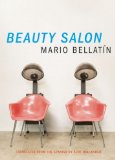Some authors take time creating an overall feel for their book. But when you’re writing a novella of well under 100 pages, you don’t have much time to set the tone. Mexican novelist Mario Bellatin doesn’t waste any establishing the tenor of Beauty Salon. He does it with the first two sentences: “A few years ago my interest in aquariums led me to decorate by beauty salon with colored fish. Now that the salon has become the Terminal, where people who have nowhere to die end their days, it’s been very hard on me to see the fish disappear.”
 You could take it for dark humor, but there is only the slightests taste of that in this work. With that brief opening, Bellatin sets the stage for almost all that’s coming. The unnamed narrator is, in fact, more affected by the death of his fish than humans. That’s because the world of Beauty Salon is immersed in a plague so extensive and fatal that most bodies end up in mass graves at the cemetery. Death has become so prevalent that emotional attachment is no longer worth the psychological toll.
You could take it for dark humor, but there is only the slightests taste of that in this work. With that brief opening, Bellatin sets the stage for almost all that’s coming. The unnamed narrator is, in fact, more affected by the death of his fish than humans. That’s because the world of Beauty Salon is immersed in a plague so extensive and fatal that most bodies end up in mass graves at the cemetery. Death has become so prevalent that emotional attachment is no longer worth the psychological toll.
The narrator is a transvestite gay hair stylist who first opened the doors of his beauty salon as a hospice to friends who were refused care at hospitals for fear of spreading the infection. It its heyday as a functioning business, he and his two co-workers wore dresses when fixing hair and when cruising for men at night. The plague has claimed both his friends and he now spends his time providing a refuge for men whose only other option is to die on the streets. No longer a beauty salon, it has come to be know simply as the Terminal.
Bellatin’s work, first published in Spanish in 1999 and making its first American appearance in a translation by Kurt Hollander, is about as allegorical as they come. Between the symptoms of the infectious plague and the narrator’s recollections, it would be difficult to mistake the novella from dealing with anything other than HIV/AIDS. At the same time, the discussion of the aquariums, the fish in them and their changes broadens the allegory from just the beauty salon to the world at large. And Bellatin’s description of the world is blunt and brutal.
Just as the city and country are unidentified, individual identity no longer exists at the Terminal. It accepts as “guests” only those in advanced stages of the disease. Yet even then the guests “are nothing more to me than bodies on the verge of disappearing.” Doctors and medicine are prohibited, along with spiritual or herbal healers or support from family or friends. That’s because, according to the narrator, the best option is “a quick death under the most comfortable conditions.”
Yet the concepts of dispatch and detachment impact the story in a unintended — or perhaps intentional — fashion. At only 63 pages, it perhaps even stretches the term to call it minimalist. Beauty Salon evokes the better elements of post-apocalyptic and dystopian literature but raises the question of whether it is too brief to stand alone. While the length may invite recurrent rereading and pondering, the story may be better served as part of a broader collection. Of course, if your main complaint about an author’s work is that it wasn’t long enough, maybe that is as telling a comment as you can make..
All our efforts were merely vain attempts to ease our conscience.
Mario Bellatin, Beauty Salon







